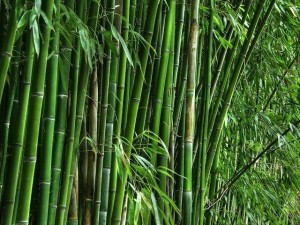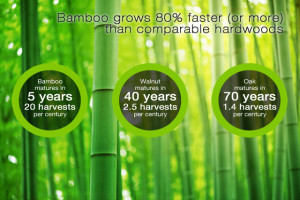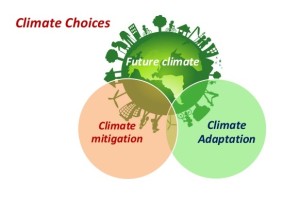 Bamboo – one of the fastest growing and highest yielding renewable natural resource making it a good substitute to wood in mitigating pressure on natural forests. Bamboo is a family of grass; it matures in as little as 3 to 5 years much faster than hardwood trees. It sends out new shoots after each harvest. Bamboo has unrivalled capacity to capture carbon.
Bamboo – one of the fastest growing and highest yielding renewable natural resource making it a good substitute to wood in mitigating pressure on natural forests. Bamboo is a family of grass; it matures in as little as 3 to 5 years much faster than hardwood trees. It sends out new shoots after each harvest. Bamboo has unrivalled capacity to capture carbon.
Because of its rapid biomass accumulation and effective fixation of CO2, it has a high carbon sequestration capacity. Bamboo’s carbon sequestration properties have been studied in countries where it naturally forms wild forests, such as Mexico and China. For example, China has a native giant species of bamboo called Moso bamboo. As per a study conducted few years back, one hectare (an area roughly the size of an athletics track) of this species can store up to 250 tons of carbon. Other studies have shown that compared to some trees, bamboo has the capacity to sequester 400 percent more carbon per unit area.
https://twitter.com/JoyfullyECO/status/883838172215508992
Also read: Carbon stocks in bamboo ecosystems worldwide: Estimates and uncertainties
 Bamboo can play an important role in reducing pressure on forestry resources as demand for timber continue to increase globally. For instance, in China, since nationwide logging bans of certain forests came into effect in 1998, bamboo has increasingly been seen as a possible substitute to timber and has entered many markets traditionally dominated by timber. The successful use of bamboo in different product lines, ranging from furniture and flooring to paper and packaging demonstrates the high potential for bamboo as a more sustainable alternative material in production of many products.
Bamboo can play an important role in reducing pressure on forestry resources as demand for timber continue to increase globally. For instance, in China, since nationwide logging bans of certain forests came into effect in 1998, bamboo has increasingly been seen as a possible substitute to timber and has entered many markets traditionally dominated by timber. The successful use of bamboo in different product lines, ranging from furniture and flooring to paper and packaging demonstrates the high potential for bamboo as a more sustainable alternative material in production of many products.
 Governments would do well to promote and enable the development of bamboo, which not only has proven its high carbon sequestration capacity to support climate mitigation but could also adequately support local resource-based economies. Bamboo has immense economic potential given its diverse use.
Governments would do well to promote and enable the development of bamboo, which not only has proven its high carbon sequestration capacity to support climate mitigation but could also adequately support local resource-based economies. Bamboo has immense economic potential given its diverse use.
Asian countries like China, Indonesia, Taiwan, Philippines, Thailand, Japan, Malaysia, and Vietnam are making tremendous progress in Bamboo and truly proving that Bamboo is Green Gold. We need to promote the social, environmental and economic advantages of Bamboo to build youth engagement in bamboo cultivation and bamboo entrepreneurship.
India has the second largest reserves of bamboo in the world. Leveraging this can spur gainful employment and income generation especially in states like Assam like the rest of North East India has substantial bamboo reserves and where bamboo is an intrinsic part of the local culture.
